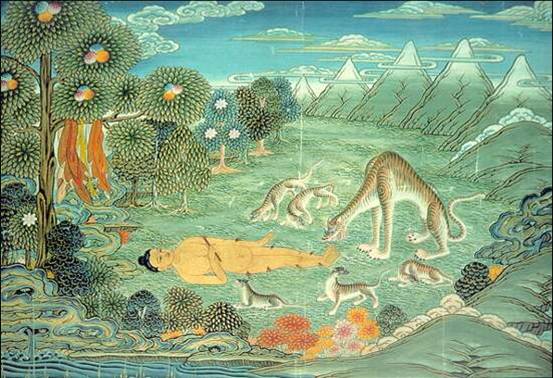
Jataka on tigress
The compassion of the Buddha touches every living being.
His perfect love, dispassionate and unlimited,
Resonates throughout all his former lives.
Pg 3 – Before he became the Buddha, the Bodhisattva, in a series of lives too numerous to mention, through his wisdom blessed the world with countless demonstrations of his compassion, shown through giving, kind words, helpfulness, and consistency between words and deeds.
In one of his lifetimes, the Bodhisattva took birth in a family of brahmans which was renowned for purity of conduct and spiritual devotion. And as a result of merit earned in former lives, he found himself showered with wealth, distinction, and fame.
As a youth, the depth of his intellect was matched only by his eagerness to learn. He soon mastered the arts and sciences so well that the brahmans revered him as an authority dependable as the law itself; to the ksatriya warriors, he was as venerable as a king. To those thirsty for knowledge, he seemed a reservoir never empty; to ordinary people, he seemed a god.
Pg 4 – But he did not delight in power or wealth or fame. His former actions and his constant reflection on the Dharma had purified his mind; he saw all too clearly the inevitable suffering that accompanies worldly pleasure, and the thought of renunciation was familiar to him. Without remorse, he shook off the householder’s life as if it were an illness, and moved to a forest retreat which became ornamented by his presence. – … Continue reading